Namibia 2006 - Diary of a Hunting Trip, Part 1
Michael Engster
Foreword by Mike Mistelske:
In this, his diary of a trip to Namibia, Chapter member Michael Engster captures many of the flavors of Africa. Michael’s writing style - the touch of his German “accent”- makes for delightful reading, and the reader can easily see and feel and taste Michael’s experience.
Michael’s diary is presented in three parts, starting with “Part 1” in this issue.
Thanks, Michael, for sharing this with us.
We have in America the Two-Hearted River tradition: taking your wounds to the wilderness for a cure, a conversation, a rest or whatever. And as in the Hemmingway story, if your wounds are not too bad, it works. But this is not Michigan, or Faulkner’s Big Woods in Mississippi for that matter. This is Africa!
Michael Engster
1-27-2006
Another bad week for my family. Well, we did not have a lot of good ones in the last three years, years filled with tragedy and hardship.
I am walking south, cross Charlie Creek behind my house and go up John Wayne Hill. From there I have a good look over most of our little ranch, and there is also the place for me to think and reflect.
I just brought my son Martin home. He had surgery again and I wonder if he ever gets over the accident that killed his to-be wife and ended his career in the United States Marine Corps. He is a tough guy but I have seen him hurt too often. He needs a break.
The two car accidents we had this week, both of them not being our fault, just add to the overall misery. A big Whitetail deer ran into my wife’s brand new car causing severe damage, and while Martin was in surgery a fat, ignorant, white trash woman without insurance but with a cell-phone glued to her ear, rear ended me in the middle of Oklahoma City.
To hell with her and her cell-phone! Now I am sitting on my beloved hill and start thinking about our upcoming trip to Africa. Hopefully Martin will be totally recovered by then to enjoy some serious hunting at the edge of the Kalahari Desert on a ranch called NABABIS. We have another five weeks to get him ready, but he recovers fast and should be o.k.
This time Sonja, my wife for nearly 40 years, is not coming with us. Lupus and a bad back do not allow her to travel that far. What can I say.
However we have two other people going to share a new African adventure with us: James Weber from Connecticut and Susanne Scheiter from the Bavarian Forrest in Germany.
Susanne is the daughter of an old friend from the Fatherland, and she is very dear to my heart. She likes Martin and his little son Max, however these feelings seem to be somehow one-sided.
I hope that some fire might be rekindled on this trip. At least the two of them will find out where they stand.
We will see. Matters of the heart can not be solved with the brain. Unfortunately!
My thoughts drift back to our last Africa trip and the great times we had. The bond between people just seems to be greater when you are out there, away from the concrete, the noise, the deadlines, the rush hours, the every-day rat race and the thousands of faceless people in a deafening jungle called “City”. Another five weeks and we will see a bigger sky again, and hear the sounds of the Black Continent.
I get up, grab my gun, walk the rest of our property south to the oil well, then west to a small ravine, back north, down the hill to Charlie Creek and to our house. Six deer cross my way but nothing else. Anyway, I have been walking for two hours and feel better.
2-25-2006
A few more days and we are in Africa. Things at home however are not too good. Too much stress and pressure, too many doctor bills and ailments, and while Martin is recovering, Sonja is plagued with another Lupus attack. All this creates tension and the feeling that life in general sucks. I realize that my batteries have to be recharged so that days like this can be handled, and I want to thank my wife right here that she never tried to stop me when I had the feeling to follow one of my dreams. I wish she would be able to come along like last time.
Later, watching a documentary about a guy who lived with grizzly bears for thirteen years does not really improve my overall depressed mood but gives me to think.
What makes a person abandon our “civilized” world and choose raw nature instead? It must be more then just bare foolishness. Maybe nature is the place where man can find himself or more so his soul. Maybe this is the one and only escape out of a corrupt world that answers only to the money god, no matter what.
Well, the grizzly man Timothy Treadwell got finally killed, but what about the thirteen years of fulfillment that he was allowed to have?
I feel strangely drawn to this troubled young man who tried to find himself in the wilderness just like David Henry Thoreau, Ralph Waldo Emerson, Muir, White Owl, Everett Ruess, Robert Ruark and Christopher McCandless to just name a few. They all were highly intelligent. They all did not fit into our world of progress. For them progress meant destruction of what they cherished the most: Nature!
Do not get me wrong, I do not want to compare myself with these people, but deep inside I envy them for their courage to follow their hearts. But then again, maybe it was not courage but desperation to escape a world they just did not fit in. Only they know.
Well, I am at least in the position to leave my world for a few days and feel the Black Continent again. Soul food? Damned right you are! And I am going to inhale it. You can bet on that.
3-4-2006
In the meantime, after realizing that Susanne Scheiter will not be with us, we made it from Ponca City to Wichita and from there to Atlanta where we spent a night in a not-so-good motel. There we met James Weber who came in from Hartford.
The early morning ordeal at the airport, security line, ticket line, security line again due to our hunting rifles, line during boarding, etc. is behind us. Thanks one more time to Osama bin Laden who created this clusterf….
Now we are stacked like sardines in an airbus, the most uncomfortable airplane that I know. Sal Island lies behind us and seven more hours from now on we should touch down in Johannesburg –South African Union.
Four hours’ lay-over, two more hours’ flight to Windhoek, security again, and hopefully Michael Fechter from the Omunjereke Farm will be there to pick us up.
Well, he did pick us up in his 4x4 bus, and after a drive through a nice African scenery including a detour-a road washed out by heavy rain, we make a right turn and trade the dirt road for a trail that leads us to our final destination.
James, who has never been here before, gets his first impression of Namibian wildlife. He also gets excited about the abundance of wild game.
And then we are there! Katrin, the woman of the house, as well as Rolli and Balthasar, the dogs of the house, are in the driveway waiting for us. I see even more familiar faces like Bernhard, the Herero foreman, little Petrus who takes care of all the horses here at Omunjereke, Karoline and Elizabeth, the mother and daughter team in the kitchen. It feels good to be back. We are shown to our rooms, decorated with hides and trophies; and we are told to be at the grass-roofed hut for a supper accompanied by a serious sundowner.
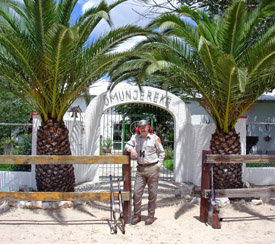
Finally, we made it to Omunjereke Farm. I’m worn out from the trip.
Oryx steak, salad, potatoes, pudding, heavy red wine and a good conversation lets us forget how tired we are. Remember, we left Ponca City Thursday around noon and now it is Saturday 7.30 p.m.
The wine finally does the trick. We go to bed early. I guess I am too tired to think about our first hunting day.
3-5-2006
The birds wake me up, and there are a lot of them. The yellow weaver birds alone have at least 25 nests in the tree right in front of my window. It is dawning, and I can watch the sun rise from my bed. How come it looks so different here? Everything just seems to have more color, be more intense, more basic and alive.
I hope that the pictures that I am taking can capture the moment.
After getting dressed in my hunting gear I walk across the yard towards the main building where the breakfast table is set. “Guten morgen, guten morgen”. It is always kind of strange to me to be in Africa getting addressed in my home language, which is German.
Well, let us not forget that 100 years ago this place was called German Southwest Africa.
I wave good morning to the people in the yard, pet the dogs and go into the house. The breakfast table is set and looks as good as the last time I was here.
Kudu liver sausage, smoked hartebeest, springbuck roast, sliced eland meat, cheese, home made sausage, all kinds of vegetables, marmalade, coffee, milk and juice. What more do you want!
In other words we have a great breakfast and start to discuss the course of the day.
First we want to look for baboons along the river bed of the White Nossob and then just play it as it unfolds. James Weber is also interested in an oryx and maybe a warthog. I will tag along as the backup shooter.
We mount up. Bernhard is the driver; Martin and James are the first in line to shoot, while Michael Fechter and I sit on the back seat with binoculars ready.
Everything is green, the grass higher then ever; this does not look like arid land any more; hunting will be difficult. Fechter tells me that he has never seen so much rain in his lifetime, and back in Oklahoma we have not seen rain for seven months. But the scientists tell us that the climate is not changing. Bullsh…!
We see a bunch of baboons, but our small stalk comes too late. They must have seen us and are gone. A warthog crosses our trail and disappears in a ditch. We stumble through the tall and wet grass, fall into warthog dens, get dirty and scratched up and go back to our truck. What a start.
Bernhard starts driving and we rumble slowly through tall grass and wet thorny brush. Like always, we are amazed by the great number of animals. Kudu cows, hartebeest, the black and white faces of the oryx, elegant springbuck, guinea fowl, frankolins and birds, birds and more birds.
We take a lot of pictures, and that is when we see a good-sized warthog making its way through the brush. The wind is in our favor and four guys, three of them each with a gun and one of them with a shooting stick, jump off of the truck. The stalk is on; adrenalin is flowing for the first time on this trip.
“Whoever gets the shot gets to shoot”, Fechter says, and he is the PH and boss here. Martin follows him, James stays more to the right while I cover the left flank with my 9,3x74R ready for action.
A few tense moments, and the hog comes back in sight. Martin has the best position, Fechter gets the shooting stick ready, and I hear the .470N.E. boom. No more ifs, ands or buts – the warthog dies on the spot shot through the head with a 500 grain soft-pointed bullet.
Waidmannsheil and time to shake hands and take pictures. Martin did a super shot with his double rifle. Smiles all over.
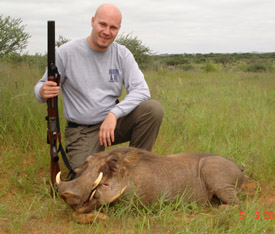
My son, Martin; first day warthog
These are the better moments in life, and we celebrate with some stiff shots of good old gin.
Bernhard pulls up and we have a new passenger when we leave the scene of the “crime”. The farm workers will have a feast tonight.
I look at the pig, its big teeth; and I watch the blood running down the tailgate. My thoughts however are somewhere else when Bernhard hits the brakes. I nearly fall off my little bench seat. “Oryx, and a good one!” Michael Fechter and Bernhard see things before we even think about them. “Well James, you want to give it a try?” This is not really a question, and our James Weber does not have to be pushed.
Martin and I stay on the truck and see the hunt unfold. Using every possible cover Fechter and James make their way closer to the two oryx. One of them seems to get nervous, wanders into the brush and just disappears. The second one starts moving back and forth to finally makes up his mind and walks in the wrong direction. In other words, the oryx moves toward the hunters, not knowing that danger is waiting.
I have my binoculars on the animal when it gets knocked off its feet by a 150 grain .300 Win.mag bear claw bullet. James obviously knows how to shoot a gun.
Bernhard pushes the truck through the brush, and for the second time we do the Waidmannsheil thing, drink gin with the left hand (an old German hunting tradition), take pictures and shake hands on James Weber’s first African animal.
Needless to say, we have a very happy hunter in our midst.
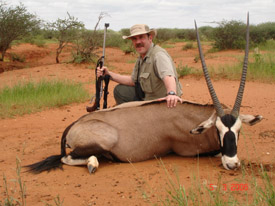
Our friend, James; oryx-his first African animal
After loading the gemsbok (oryx) onto the truck there is little room left for us, and Bernhard is heading towards the farm. Like always he tortures the clutch of our truck, but that is the way he drives - Herero style.
On the way back we find a dead kudu bull with nice horns in a dry river bed. We can not determine the cause of death and blame a poisonous snake. The animal is bloated already and does not smell too good. The vultures will be eating well today.
Back at the farm the boys are already waiting butcher knives in hand, ready to go at it. And that they do. With their share of the meat and especially the innards of these animals, there will be a food-party going down tonight.
I get myself cleaned up and walk over to the main house where oryx meat, noodles, salad and pudding is waiting for us. A small glass of wine washes everything down.
Nap time comes next. Jet lag is still kicking our butts.
Bernhard, Martin and James Weber are one more time ready to kill a baboon, while Michael Fechter and I are meat hunting for the Windhoek slaughterhouse. And so we slowly make our way north along one of the many washed out ravines. The beauty of the landscape that surrounds us is only topped by the temperature that leaves not a dry spot on my body. In other words: My mouth is totally dried out while my shirt and even my pants are soaking wet. Eventually I am just following Fechter without paying any attention, and that is when I run into him.
“Do not shoot me; shoot that old bull over there if you can.” I wipe the sweat off my eyes. “Sure thing master Fechter”. My gun comes up against my shoulder, the crosshairs center on the chest of the oryx, a clean trigger break and the oryx disappears in the tall grass about 120 yards away from us.
I put my finger on the rear trigger while we are walking up to the downed animal but there is no need for another bullet. Needless to say, I feel good.
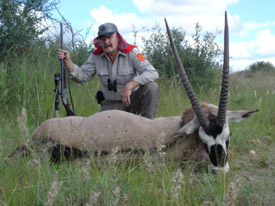
My old bull oryx
We check the teeth and find them worn down to the gum line. “I told you that this is an old one. Good stuff for the sausage factory. Nice shot, by the way”. Fechter does not say things like that too often.
Berhard must have heard the shot and comes crashing through the brush. One more time I am amazed what these farm vehicles have to go through.
We have a “Waidmannsheil Drink” and load up the second oryx of the day. Further hunting does not produce any additional meat, and we make our way back to Omunjereke to enjoy another African night under a grass-roofed hut with steaks, potatoes, squash type stuff, salad, pudding and various sundowners.
We make plans for tomorrow to go to Auas for eland. Martin’s big quest is to harvest one of these impressive animals.
James is a fountain for jokes and so is Martin. We have a few good laughs before the lights go out.
3-6-2006
After breakfast we load our stuff into Fechter's hunting bus and drive to the Auas Game Lodge. We have been there before but that was a few years ago. Auas has been getting bigger catering mostly to tree huggers and animal watchers but it is still a very nice place with an abundance of wildlife.
I meet some familiar and some not-so-familiar faces, and old fashioned as I am, it is hard for me to accept the PH who turns out to be a woman. But then again she might be better then what I give her credit for. I hope she is strong enough to survive the “political” situation on this farm which has been poisoned years ago by ignorance and greed.
Who cares, we are here for eland antelope!
Our tracker is called Ambrosius, a long name for a short and skinny guy. He is also the driver of a brand new Toyota truck and shows us what the vehicle is able to do. Off and on we stop to take pictures of giraffes, zebras, gnus (wildebeest) and herds of springbuck. This farm is full of animals, and it does not take long for Ambrosius and Michael Fechter to spot a large herd of eland. If I would have to guess my number would have been higher then one hundred. Fechter points out some nice bulls, but with 100 animals you also have 200 eyes watching any approach. This is going to be a tough stalk.
James, Ambrosius and I have to stay back with the truck and a walky-talky to keep track of the herd’s movement if possible, while Martin and Fechter disappear into the bush to start the stalk. The herd is more than one mile away, and we get ready for some serious waiting.
And waiting we are. About two hours later we spot Fechter and Martin for a brief moment. The herd is in motion and it seems to be hard for our hunters to get closer. Another hour before we hear a shot and another ten minutes before we hear Fechter on the walky-talky. He asks us about a big eland bull, but we are unable to see any wounded-looking animal and decide to meet at the point where Martin shot.
We do find a small blood trail and while Fechter and Martin try to outrun the eland herd with the truck and cut them off, Ambrosius, James and I work on tracking the bull down. Two different approaches hopefully deliver the outcome we all want.
And now we get an education in tracking one wounded eland bull within a herd of at least a hundred animals. Ambrosius is like a dog and never slows down. Ever so often he points to the ground to show us things that we do not see. This guy is strictly amazing to say the least.
James suffers under the heat and we have to slow down. We find hardly any blood and I wonder how an animal is able to digest a .470 N.E. slug and still follow the herd without falling behind. And that is when we hear another shot and another one. We hurry up and climb another hill. Another shot rings out while we are getting closer. We can see the Toyota truck but Martin and Fechter are gone. Another shot. The walky-talky comes to life and we hear the good news: “He [the eland] is down; we got him; he is down.”
Moments later I see the first eland of my life from a close distance. What an animal that is that looks great and impressive even in death. An elegant monster with strong, spiraled stubby horns, a grayish coat and brown hair on the forehead – in my book this is the Goliath of the plains game.
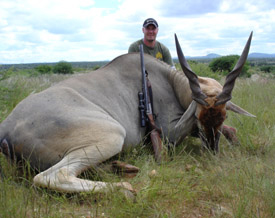
Martin’s pretty happy with his eland
And there is my son with a big grin on his face that was not there two hours ago when I saw him being a little nervous. This was probably one of the most interesting stalks of his life, and he did all this just a few weeks after a major surgery. Once a Marine – always a Marine. I remember my older son Stephan going on an elk hunt in Wyoming with a cast on his leg. I guess my kids are no sissies!
It takes Martin, James and me a while to suck this all in and digest what we were allowed to experience: a good hunt with good company, a beautiful setting and most of all, a good outcome.
This eland antelope will be immortal from this day on, because a day like that will always be in our memory. A day like that makes you rich and sad at the same time, it makes you wonder if you will ever have a day like that again.
Eventually all the pictures are taken, we all had a shot of warm gin, the guns are empty and with a lot of muscle and a small winch we load the big antelope on the truck heading back to the Auas lodge, where a team of butchers seem to have been waiting for us. This is a lot of fresh meat that we are bringing in and nobody lets it go to waste.
We have another drink, some food, a good shower and an afternoon nap to get ready for a baboon hunt on the “monkey mountain”.
Later Michael Fechter is driving us to a monster pile of rocks that might be sticking 600 feet out of the plains. I bet it would take you at least two hours to walk around it. This is the monkey mountain because the baboons like to come out of the plains in the evening and sleep at elevated places like that.
James takes position on the south side, Martin will cover the east slope and I walk up to the north side. I can see Martin; we wave at each other, get the guns loaded and wait. Wildebeest and a bunch of the dainty springbuck walk all the way up to me. Picture time, but not without the camera which I left in Fechter’s car. Warthogs make their way through the tall grass, and a jackal is on the prowl.
No monkeys however.
The sun starts going down and I decide to leave my post and move over to Martin who starts waving at me. I stop in my tracks, put the binos up and see a bunch of baboons moving swiftly towards the southern hillside. A shot rings out and now all hell brakes loose. The baboons come our way. They are all over the mountain and do not really know what is going on. Martin operates the bolt of his 30/06 and fires. A baboon falls out of the cliffs. He shoots again and I do not even get my gun up. Obviously I am too slow for this game but I have only one shot and want to make it count. Martin should be out of ammo by now.
“You did not fire one shot Dad. What is wrong with you?” “I just did not get it together.”
We climb down the hill and then I see him outlined against the evening sky: a big baboon sitting on top of the huge rock pile, watching us.
I open my gun and slide a 9.3 into the chamber. “Watch this, Martin.” I take my time, push the double set trigger forward, adjust my sight picture one more time and slightly touch the trigger of my double. The 286 grain bullet slams into the baboon and knocks him off the cliff. I guess I can still do it.
It is getting too dark too quick, like always in Africa and so we empty the guns, forget about the baboons for now and make our way towards a set of headlights that approaches us. Katrin and Michael Fechter pick us up, James is a minute behind us and on the way back to the lodge our shots get longer and trickier.
We hit the bar at the Auas lodge, have good food, drink too much and talk too loud. We are happy and do not give a sh… about the rest of the world. We had a great day – life is good for a change. And tomorrow we are going towards the Kalahari to a Farm called Nababis. If you are looking for a remote place, that is where we are going.
Michael Engster
Ponca City, OK
To be Continued...